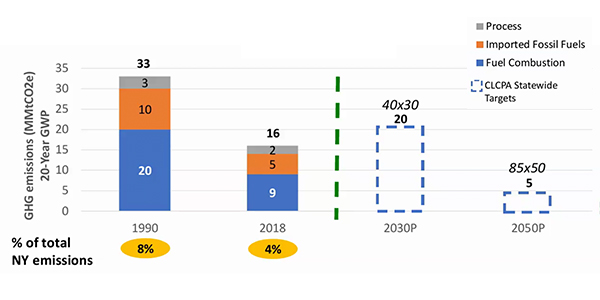Residents speaking to New York’s Climate Action Council Wednesday urged haste in stopping construction of new gas-fired power plants, closing old peaker plants and increasing the use of energy storage and other new technologies to reduce emissions and move the state toward a net-zero grid.
Laura Burkhart, an engineer from Rockland County, spoke of the importance of shutting down peaker plants in the state and replacing them with solar plus storage where feasible.
“As you know, peaker plants have several shortcomings,” Burkhart told the CAC’s Power Generation Advisory Panel. Many of them are old and contribute significantly to local air pollution, and they’re usually located in disadvantaged communities, and they greatly increase the cost of electricity to ratepayers due to the capacity payments they receive just for existing.”
New regulations under the state’s Climate Leadership and Community Protection Act (CLCPA) require a 40% decrease of methane and other greenhouse gases by 2030 and an 85% cut by midcentury.
Anne Rhodes, energy educator with Cornell Cooperative Extension in Tompkins County, said, “If we are going to switch to wind and solar, we need way, way more storage. … I’d like to emphasize that we should not wait on storage solutions and that we move forward quickly.”
Rhodes added that community support is needed and “one thing that will mute resistance is if we take care of workers.”
Stop Using Gas
Environmentalist Gale Pisha from Rockland County urged the state to stop permitting new gas power plants, including those being proposed for “so called” repowering.
“Either these new plants will operate for another 30 years or more, which will keep New York state from reaching the goals of CLCPA, or they’ll become useless,” Pisha said. “And why should resources be put into building new gas plants when those same resources need to be used to build renewable generation, upgrade our transmission and develop distributed generation to increase the grid’s reliability and resiliency?”
Sixty-eight percent of the state’s electricity is currently generated by fossil fuels, so adding more is going in the opposite direction from what we need, Pisha said.
“I would far prefer that we have rolling blackouts than build an additional gas-fired power plant,” said Tara Vamos of NY Renews, speaking for herself as a citizen. “Enough is enough.”
New York’s climate goals are a good starting point, but with ocean currents slowing down and the earth’s climate becoming increasingly unpredictable and causing thousands of deaths and billions of dollars’ worth of damage per year, “we should be shooting for shorter timeframes,” Vamos said.
It would be unconscionable to allow new gas plants just because they say they’ll switch to green hydrogen in the future, she said.
Environmental scientist Suzanne Hunt said she wanted “to reframe how we’re talking about the green hydrogen issue, which is just a tool, it’s not good or bad, and depends on how it’s used. The most helpful thing you can do is craft recommendations dictating how to use the tool correctly for the climate.”
Fuel cells do not combust hydrogen, but work more like a battery, and are a useful tool in the climate toolkit, she said.
Kathleen McCarthy, a restoration ecologist in New York City, said she has been alarmed by climate change since first seeing “a climate model with all of the positive feedbacks. Now that those models and projections have not only been verified by present conditions but show us veering towards the worst-case scenario, I’m closer to being terrified.”
The animals and plants that sustain humanity cannot survive the changes projected without a drastic reduction in greenhouse gases, McCarthy said. “Now that we’re at the ninth hour, it’s important that our solutions be real solutions, not fake ones, so that we have a net reduction of greenhouse gases.”
Simon Strauss of the Ulster County Environmental Management Council and the Mid-Hudson Sustainability Coalition addressed the panel’s draft recommendation for “proactive and timely investment in local transmission and distribution infrastructure, and associated cost-sharing with utilities.”
“I’d like to ask how the panel, on behalf of the Climate Action Council, is going to, first, ensure that the utilities do make those proactive and timely investments, and second, how are those investments to be paid for? By the state, by the utility or by the ratepayers?” Strauss said.
He noted that in the pending Central Hudson Gas and Electric rate case, he has asked how the utility plans to address its CLCPA goals for renewable energy by 2030 and 2040.
“The impression I have is that other than local and transmission upgrades to permit large-scale renewables to be brought in on a wholesale basis, there is no plan to beef up the local distribution grid to accommodate local community-distributed generation,” Strauss said.
“And on these calls with this rate case we hear no dissent from the DPS staff, so I’d like to ask that you on the power generation panel give strong guidance to the Climate Action Council, and thus to the Department of Public Service, that you are looking for very significant distributed generation [DG] in the renewable energy generation mix, and an upgraded distribution system capable of accommodating that DG,” Strauss said.
Chairing the meeting, Sarah Osgood, director of policy implementation at the state’s Department of Public Service, confirmed one more public comment session on March 24 before the panel makes its final scoping plan recommendations to the CAC.





